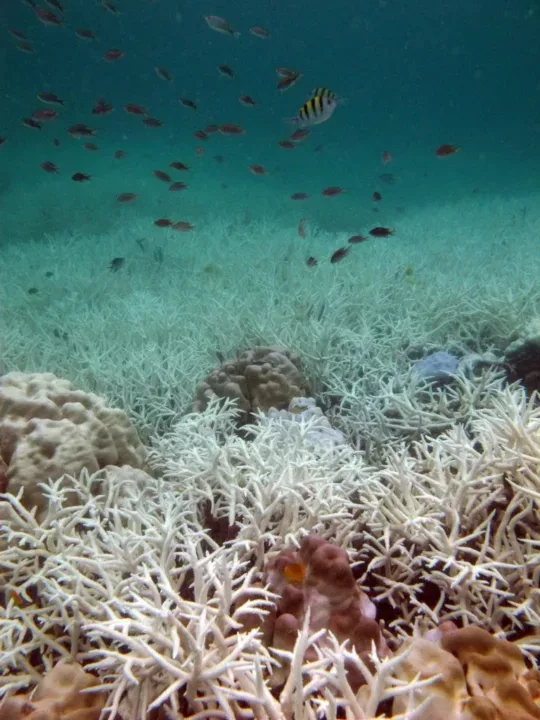Coral reef scientists have concluded that the greenhouse gas emission reduction pledges submitted to date by the international community for consideration at the upcoming Conference of the Parties to the Climate Change Convention (COP21), to be held at the end of next month in Paris, fall well short of what is required to avoid this biodiversity catastrophe.
A team of scientists from the International Society for Reef Studies (ISRS) (led by Dr. Ove Hoegh-Guldberg of the University of Queensland) has assessed the measures needed to avoid permanent extensive loss of living reef ecosystems. An increasing number of ocean regions have reported extensive coral bleaching – whitening and death of corals due to extreme temperatures – over recent months and a major Global Coral Bleaching Event has been recognised by the United States National Oceanographic & Atmospheric Administration (NOAA) and collaborating organisations.
The conclusions of the team (checked by a larger panel of specialists) were that if average global surface temperatures increase by 2°C or more, relative to the pre-industrial period, the resultant ocean warming, along with acidification, will lead to continued widespread destruction of coral reef ecosystems over the next few decades. Already the amounts of live coral on reef structures across many coral reef areas have been reduced by half by coral bleaching and other factors, with ecosystems worth many billion dollars per year in terms of fisheries, tourism, recreation and coastal protection, threatened with destruction.
The Society is therefore calling on the delegates at the Paris Climate Change Conference to commit to limiting atmospheric carbon dioxide (CO2) concentrations to no more than 450 ppm in the short-term, and reducing them to 350ppm in the long-term. (CO2 concentrations are currently around 400 ppm, having risen from 280 ppm over the past century.) Only restrictions on such a scale can keep average global temperature increase to less than 2°C (or 3.6oF) in the short-term, and less than 1.5oC (or 2.7oF) in the long-term.
ISRS secretary, Professor Rupert Ormond of Heriot-Watt University, Edinburgh, UK, says “this looks like the beginning of the end for coral reefs, certainly as we have known them. Coral reefs are the canary down the mine for mankind, so far as climate change is concerned. Corals are highly productive but very simple animals, and are less able to cope with rising temperatures than any other group of organisms on earth.” 
Lead author, Professor Ove Hoegh-Guldberg of the Global Change Institute at The University of Queensland, Brisbane, Australia said “With hundreds of millions of people relying on coral reef fisheries and tourism for their livelihood and sustenance, the repercussions of continued global coral bleaching could be disastrous.”
ISRS President Ruth Gates said “I have personally just watched over 50 % of the living coral in Kaneohe Bay, Hawaii, bleach for the second year in a row, and all across the main islands in Hawaii corals are now whitening and beginning to die. It is totally alarming.”
The International Society for Reef Studies (ISRS) is the principal association (learned society) to which scientists and managers and others professionally concerned with coral reefs belong. It publishes the highly rated scientific journal “Coral Reefs” and organises the very large four-yearly International Coral Reef Symposium, the next to be held in June 2016, in Hawaii.
Contacts:
- Ruth D. Gates (President ISRS): [email protected]
- Rupert Ormond: [email protected]
- Professor Ove Hoegh-Guldberg (ISRS lead author): [email protected]

